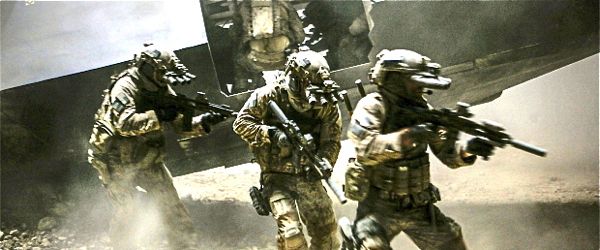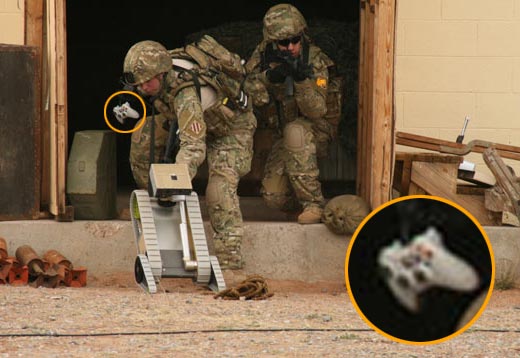
Call of Duty Advanced Warfare Is Brainchild of Pentagon Adviser – The State Is Influencing Entertainment
It’s no secret that agencies of the United States and other governments are heavily involved with the creation of entertainment, after all propaganda isn’t a word for no reason. Hollywood in particular have a long track record of liaising and shmooozing with the suits of political and military power.
Of course, any filmmaker who takes their job seriously is going to try and craft their movie as true to life as possible. That’s naturally going to involve exploring military weaponry and equipment, protocols, strategy, and simply whether plots are realistic or not. On a pure empirical basis, there’s nothing wrong with talking to Nancy from the Department of Defense’s entertainment relations office and then meeting with Sergeant Bob to discuss how units get deployed in a war zone, or what [insert vehicle name here] really looks like.

However it would be naïve to dismiss that in some instances state involvement reaches the point of full blown collaboration and influence over plot – be that for vanity, self image, propaganda or other unknown reasons.
It is also worth pondering the fact that just because you may have met with a CIA officer, or somebody from the Pentagon and asked for their input, that what they’re telling you is sincere or the truth. The accuracy of the information they provide is only as sound as their honesty.
Tom Secker has been doing some interesting grunt work over at SpyCulture.com collating and chasing up FOIA requests about state involvement in films. The sheer amount and variety of movies with collaboration from the DOD, Air-force, and even the National Guard is quite staggering.
Tom has previously written about the CIA’s influence over Zero Dark Thirty for WideShut, and he overviewed some of his FOIA findings on Smells Like Human Spirit.
Video Games As Militainment
Another area of entertainment that is influenced by the state – though perhaps to a lesser extent – is video games, especially those with war themes. Just this week it emerged that the new Call of Duty installment “Advanced Warfare” was essentially the brainchild of a Pentagon adviser.
“Three years ago, right after we finished Modern Warfare 3, we started thinking about how to change Call of Duty,” Michael Condrey, co-founder of Sledgehammer Games, told the Guardian
“We brought in a lot of outside help – military advisers, futurologists – we got together with a scenario planner from the department of defense, who is active in the Pentagon. His job is to think about future threats and prepare ‘what if’ scenarios for the US government. So we asked him, ‘what do you think will be the conflict of tomorrow?’Apparently, the source quickly ruled out China (“he said it’s too big, it’ll eventually collapse under its own economic weight”), a resurgence of the Cold War with Russia, and a consolidation of emergent Islamic extremist states. Instead, the adviser predicted that the next threat to the security of the United States would come from a private military company. It may be some billion-dollar contract gone bad or a sudden tipping point in the ratio between national military and contracted forces.“We thought that was fascinating and provocative,” says Condrey. “What happens when an organisation that’s built for profit has access to all the latest weapons and technology – an organisation that can operate outside of the Geneva Convention, that can be purchased by the highest bidder? What if that got out of control?”
As always it looks spectacular. Gaming has reached such a level where in some cases it outdoes Hollywood in both storytelling and visuals. Indeed, Advanced Warfare has even captured the likeness and voice of actor Kevin Spacey (currently tearing it up on House of Cards) and cast him as the lead villain.
The single player campaign tells the story of Atlas Security and its sociopathic CEO (Spacey), who have gained more power than nation states in the name of securing the world from terrorism. Corporate corruption, false flag attacks, and the police state are all topics explored in the game.
Transhumanism
As somebody who is not a hardcore gamer what’s particularly striking to me is the backlash the gaming community has had against the COD franchise. As of writing, the trailer for Advanced Warfare has over 45,000 down-votes, compared to 186,000 up-votes. You only have to read the blog-o-sphere to learn that one of the prevailing criticisms of the title is its futuristic setting. Even as a layman I’ve become aware that the gaming industry is swamped with titles focussing on apocalyptic futurist scenarios, and soldiers running around in exoskeletons with zappy guns. People don’t see it as realistic and want something more gritty and plausible.
It’s anyone’s guess why the developers chose to sit down with a Pentagon adviser and let them seed the plot of the game, unless that’s just an over-exaggeration on their part, because it makes for a cool story.
From Xbox To Drones
While I’ve never been a “computer games cause violence” reactionary (other than perhaps the violence of smashing the controller after losing) there is a broader societal context to consider with some of these war based titles. If kids are consuming war every day through their consoles, and the plots are influenced by those involved in real life war, and then those kids are joining the military to pilot drones with replica gamepads, I can’t help but feel a bit gross.

Though as gross as that seemingly hidden agenda appears, it’s right out in the open with franchises like America’s Army, which was developed by the US army as PR recruitment tool. It also goes both ways with Hezbollah’s “Special Force” game allowing players to fight the Israelis.
From funding games themselves, to the technology involved in games, the US army and commercialized gaming have had a collaborative relationship since the very beginning. As explored in Cory Mead’s book War Play and summarized by the Atlantic:
The military offers funding and technical expertise to game and computer developers, and, in exchange, they give it proprietary technology and technical consulting.Beginning in 1960 and ending in the 1990s, “the armed forces took the lead in financing, sponsoring, and inventing the specific technology used in video games.” Spacewar!, the title historians consider the first video game, was developed by graduate students at MIT who were funded by the Pentagon. As Mead tells us, the 1962 side project was made on a Programmed Data Processor-1, an early microcomputer. The PDP-1’s manufacturer didn’t have a faux space-battle program in mind—one in which “two players used switches and knobs to maneuver spaceships through the gravity field of a star while firing missiles at each other”—when the hardware was designed, surely. But SpaceWar! gave birth to the navigational controls and monitor-as-sight set-up that would influence all subsequent games.
Virtual Al Qaeda
The state is not just interested in video games for propaganda purposes however, the spy agencies are also infiltrating them to eavesdrop and mine data, something known for quite a while and reaffirmed in multiple documents involving multiple agencies in the US and UK.
The NSA document, written in 2008 and titled Exploiting Terrorist Use of Games & Virtual Environments, stressed the risk of leaving games communities under-monitored, describing them as a “target-rich communications network” where intelligence targets could “hide in plain sight”.Games, the analyst wrote, “are an opportunity!”. According to the briefing notes, so many different US intelligence agents were conducting operations inside games that a “deconfliction” group was required to ensure they weren’t spying on, or interfering with, each other – the Guardian
The red under your bed has become the terrorist in your tetris.
Charles E. Wharry (Darkbird18);
This article is very important because it show how mind control is being use through advance video war games play, This website WideShut.co.uk is putting this information to let us know there is a big picture behind these video games and how the elites power who control ever form of media is behind this secret society plot. So our kids and lot of adults are at risk of being control without their knowledge because they think it only a video game; the NWO is a 2000 year plan and is very detail and thorough in it effort to set up the one world government and put everybody under its Satanic control. The unseen world is a lot more powerful then we can image and we will wake up soon and see it, I hope.


No comments:
Post a Comment